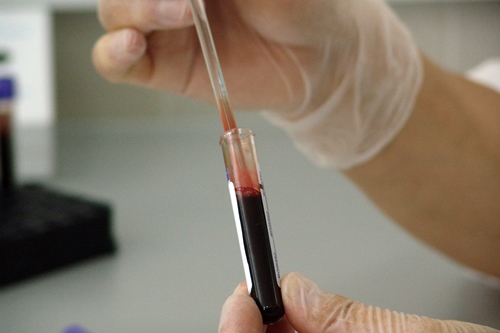4 September 2015. A synthetic antibody designed to prevent bleeding episodes among people with the most common type of hemophilia received a breakthrough therapy designation from the U.S. Food and Drug Administration. The pharmaceutical company Roche says FDA assigned the designation its biologic therapy code-named ACE910, now being tested in clinical trials.
Hemophilia is an inherited disorder, where the proteins needed to mix with platelets to allow blood to coagulate are missing. About 8 in 10 people with the condition have hemophilia type A, where the protein clotting factor 8 is missing. In type B, clotting factor 9 is missing.
ACE910 is an engineered, humanized antibody that simulates some of the functions of clotting factor 8, given once a week by injections under the skin. While ACE910 acts like factor 8, Roche says its structure does not generate reactions leading to formation of factor 8 inhibitors, a problem with traditional factor 8 replacement therapies. Formation of factor 8 inhibitors is a serious complication for some people with hemophilia, which makes control of their bleeding more difficult.
FDA assigns a breakthrough designation to therapies that address a serious condition and demonstrate through clinical evidence that the treatment is a substantial improvement over current methods. Once designated as a breakthrough therapy, a drug or biologic can receive early and frequent communications with FDA staff, quick resolution of questions, intensive guidance on drug development, and an organizational commitment from top managers.
The breakthrough designation was given to ACE910 as a preventive drug for people with hemophilia A and factor 8 inhibitors, based on an early-stage clinical trial with a small sample of individuals in Japan having severe cases of hemophilia A. The most recent report from the trial, given at a meeting of the International Society of Thrombosis and Hemostasis in June, shows ACE910 completely controlled bleeding in half of the participants (9 of 18) while receiving the therapy. Adverse effects among participants were considered mild or moderate, largely due to injection site reactions.
ACE910 was originally developed by Chugai Pharmaceutical Co. in Tokyo, and later licensed to Roche, which is now co-developing the therapy with Chugai. A late-stage clinical trial is planned to begin later this year among individuals with hemophilia A and factor 8 inhibitors. A separate trial with people having hemophilia A without factor 8 inhibitors is planned for 2016.
Read more:
- FDA Grants Orphan Status to Brain Cancer Surgery Aid
- Orphan Status Granted Eye Cancer Treatment
- Alzheimer’s Drug Granted Orphan Status for Fragile X
- Lung Cancer Antibody Given FDA Breakthrough Tag
- Breakthrough Status Given Parkinson’s Psychosis Drug
* * *


 RSS - Posts
RSS - Posts
You must be logged in to post a comment.